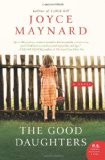Summary | Excerpt | Reading Guide | Reviews | Beyond the Book | Readalikes | Genres & Themes | Author Bio

A Novel
by Joyce Maynard
A picture from our Vermont days: One time at the feed store, where he was
buying materials to build a pen for the baby chicks he’d gotten my brother and
me for Easter—with no idea what we were going to do with them when they
got big—George spotted a wildflower seed mix for sale. He came up with this
idea of digging up our lawn and planting the whole thing with wildflower seed
instead.
Back at our rented house, he gave my brother and me paper cups filled with
seeds and instructed us to toss them in the ground wherever we wanted, to make
the flowers grow in a more natural-looking pattern. He had abandoned the idea
of rototilling up the lawn at this point. George preferred to let the seed find its
own way into the soil, he said, filling in the patches where the grass was thin.
I knew, even then, no seedlings would take root that way. Even as he was
telling Val how we’d set up a flower stand in summer, selling bouquets, I knew
we wouldn’t.
After his first round of the country-and-western phase, George had a fling
with photography. He took up puppeteering. He had this idea he could make a
living taking educational puppet shows to schools, teaching children about the
importance of good nutrition.
They were ahead of their time, Val and George, as health food types, vegetarians.
George’s plan to make a killing selling vegetable juicers, and juicer
franchises, came sometime after that. Then there was the yogurt culture he
bought from a guy he met at a truck stop in Virginia, that we would use to set
up a yogurt-making business, with pure Vermont honey (we were back up north
by this point) for sweetener. After that failed (and despite the fact that neither of
them touched seafood) came the clam shack in Maine. In between these projects
there were inventions and—this never changed—country songs.
The years we lived in New Hampshire—where I was born in July of
1950—represented the only time I can remember in which my father held down
regular employment. I was eight when we moved, my brother, Ray, twelve. But
for years after that, my mother reminisced about the house we lived in there—a
place way out on a dirt road that we’d actually bought with a five-thousanddollar
down payment given to my parents by my mother’s uncle Ted, who had
made some money from part ownership in a bubble-gum company, of all things.
Maybe it was the knowledge that a person could get rich from something
like bubble gum (or if not rich, that he could end up with an extra five thousand
dollars in his pocket, anyway) that inspired George’s own dreams of overnight
fame and fortune. Though, quick as he’d earned the bubble gum money, my
mother’s uncle had lost the majority of the cash, reinvesting the proceeds, as my
mother told me, in a scheme for edible crayons or something like that.
Perhaps it was a similarity to this uncle of ours that first attracted Val to
George. Though what kept them together was harder to figure. And whatever it
was, it didn’t keep them together much. The clearest picture I have of George is
the sight of him with that briefcase of his, walking out the door headed to some
greener pasture, or the twinkling lights of some city where someone had an
amazing deal for him, or some grand harbor where, just over the horizon, our
ship was coming in.
Excerpted from The Good Daughters by Joyce Maynard. Copyright © 2010 by Joyce Maynard. Excerpted by permission of William Morrow. All rights reserved. No part of this excerpt may be reproduced or reprinted without permission in writing from the publisher.



The fact of knowing how to read is nothing, the whole point is knowing what to read.
Click Here to find out who said this, as well as discovering other famous literary quotes!
Your guide toexceptional books
BookBrowse seeks out and recommends the best in contemporary fiction and nonfiction—books that not only engage and entertain but also deepen our understanding of ourselves and the world around us.